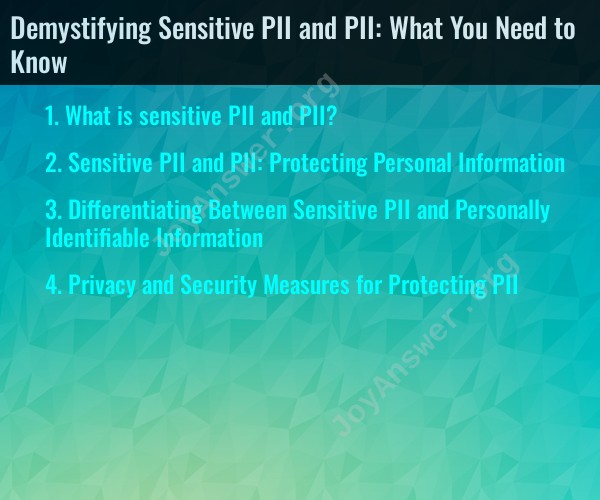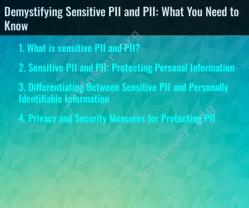What is sensitive PII and PII?
PII stands for Personally Identifiable Information, and it refers to any information that can be used to identify an individual. Sensitive PII, as the name suggests, is a subset of PII that includes particularly sensitive or private information that, if mishandled, could have serious consequences for an individual's privacy, security, or financial well-being. Here's a breakdown of these terms:
PII (Personally Identifiable Information):PII encompasses a wide range of information that can be used to identify an individual or contact them. It includes both common information, such as a person's name, and more specific data, like social security numbers. PII can be used on its own or in combination with other pieces of information to identify someone. Some common examples of PII include:
- Full Name
- Date of Birth
- Social Security Number (or equivalent national identification numbers)
- Home Address
- Email Address
- Phone Number
- Driver's License Number
- Passport Number
- Financial Account Numbers (e.g., bank account or credit card numbers)
- Biometric Data (e.g., fingerprints, facial recognition data)
Sensitive PII (Personally Identifiable Information):Sensitive PII is a subset of PII that includes information that, if exposed or mishandled, can lead to more significant harm, including identity theft, financial fraud, or personal safety risks. Sensitive PII typically includes:
- Social Security Number (or equivalent national identification numbers)
- Financial Account Numbers (e.g., bank account or credit card numbers)
- Driver's License Number
- Passport Number
- Biometric Data (e.g., fingerprints, facial recognition data)
- Medical Records
- Health Insurance Information
- Tax Identification Numbers (e.g., Individual Taxpayer Identification Numbers or Employer Identification Numbers)
The handling and protection of PII, especially sensitive PII, are subject to strict privacy and data protection regulations in many countries. Individuals and organizations are legally and ethically obligated to safeguard PII, and security breaches involving PII can lead to serious consequences, including legal penalties and reputational damage. Privacy laws, such as the European Union's GDPR and the U.S. Health Insurance Portability and Accountability Act (HIPAA), include provisions for the protection of PII and sensitive PII.
To ensure the proper handling of PII and sensitive PII, organizations and individuals should implement strong data security measures, including encryption, access controls, data minimization, and regular security audits. Additionally, it's important to stay informed about data protection regulations that apply to your specific context to ensure compliance.
Sensitive PII and PII: Protecting Personal Information
What is PII (Personally Identifiable Information)?
Personally identifiable information (PII) is any information that can be used to identify an individual. This can include information such as name, address, date of birth, Social Security number, credit card number, and email address.
What is Sensitive PII?
Sensitive personally identifiable information (SPII) is a subset of PII that is considered to be more sensitive and at a higher risk of misuse. SPII can include information such as:
- Financial information, such as credit card numbers and bank account numbers
- Medical information, such as health records and prescription information
- Government-issued identification numbers, such as Social Security numbers and passport numbers
- Biometric data, such as fingerprints and facial scans
Differentiating Between Sensitive PII and Personally Identifiable Information
The main difference between PII and SPII is the level of sensitivity and risk of misuse. PII is any information that can be used to identify an individual, but SPII is a subset of PII that is considered to be more sensitive and at a higher risk of misuse.
For example, a person's name and address are considered PII, but their Social Security number and credit card number are considered SPII. This is because a person's name and address can be used to identify them, but their Social Security number and credit card number can be used to commit fraud or identity theft.
Privacy and Security Measures for Protecting PII
There are a number of privacy and security measures that individuals and organizations can take to protect PII and SPII. Some of these measures include:
- Limiting the collection and disclosure of PII: Individuals and organizations should only collect and disclose PII when it is necessary.
- Using strong security measures to protect PII: Individuals and organizations should use strong security measures, such as encryption and password protection, to protect PII from unauthorized access.
- Educating employees and the public about PII security: Individuals and organizations should educate their employees and the public about the importance of PII security and how to protect their PII.
Conclusion
Protecting PII and SPII is important for everyone. By taking steps to protect PII, individuals and organizations can help to prevent identity theft and fraud.


